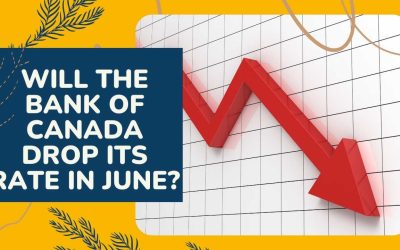
Canada’s May inflation rate has slowed, raising doubts about a possible interest rate hike by the Bank of Canada in July.
Data released by Statistics Canada shows that the annual inflation rate dropped to 3.4% in May, its slowest pace in two years, compared to 4.4% in April. The consumer price index rose 0.4% month over month, slightly below the forecasted increase of 0.5%.

The annual rate of inflation is the slowest since June 2021, aligning with the Bank of Canada’s expectations of a cooling inflation rate of around 3% by mid-year.
Impact on possible July Interest Rate Hike
In response to stronger-than-expected economic data, including higher April inflation, the central bank raised its overnight rate to 4.75% in June, the highest level in 22 years. However, the latest inflation figures may prompt the Bank of Canada to reconsider a rate hike in July.
Derek Holt, vice president of capital markets at Scotiabank, suggests that the central bank might skip the July hike and opt for a more likely rate increase in September. Money markets currently assign a 59% probability of a 25 basis points hike on July 12, down from 64% before the release of the inflation data. However, they still anticipate a quarter-point increase in September with a 100% chance.
Factors Influencing Decision
Stephen Brown, deputy chief North America economist at Capital Economics, notes that the loosening labor market in May weakens the case for a July rate hike. Despite this, Brown believes a July rate hike is still more likely than not. The Bank of Canada will consider additional economic indicators, such as economic growth data for April, June’s job figures, international trade for May, and its business and consumer surveys before making the next rate decision.
Core Measures and Inflationary Pressures
The Bank of Canada’s core measures, which exclude food and energy prices, show little progress in taming inflation. The CPI-trim three-month annualized measure declined slightly to 3.8% from April’s 3.9%, while the CPI-median dropped to 3.6% from 3.8%. The core services measure, excluding shelter, accelerated to 4.9% from 4.7%.
Certain factors continue to contribute to inflationary pressures, including rising mortgage interest costs and surging grocery prices. The Competition Bureau released a report calling for increased competition in the grocery sector to lower prices.
Energy prices declined by 12.4% compared to May 2022 due to a decrease in gasoline prices and the first year-over-year decline in natural gas prices since August 2020. Excluding food and energy, prices rose 4.0% compared to a 4.4% increase in April.
Bank of Canada’s Target and Decision-Making
The Bank of Canada aims to bring inflation down to its 2% target. The upcoming economic releases, including the June jobs report and the bank’s business outlook survey, will provide further insight into the trajectory of inflation and inform the bank’s decision-making process.
Overall, the May inflation figures indicate a slower rate of inflation in Canada, which may impact the Bank of Canada’s July interest rate announcement. Economists suggest that policymakers will consider shorter-term trends and the central bank’s preferred inflation measures. Although the annual figures show a decline, the core measures remain elevated. The Bank of Canada faces the decision of whether to proceed with another rate hike in July amid slowing inflation.






0 Comments